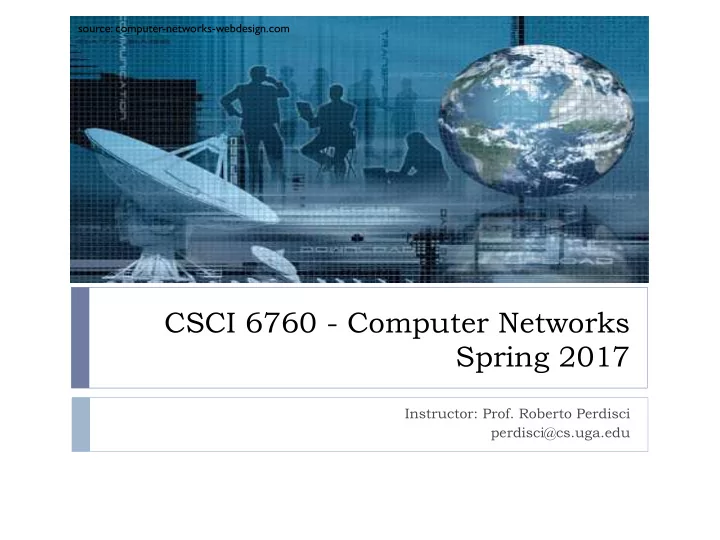

source: computer-networks-webdesign.com CSCI 6760 - Computer Networks Spring 2017 Instructor: Prof. Roberto Perdisci perdisci@cs.uga.edu
CSCI 6760 } What is the purpose of this course? } Graduate-level computer networks course } Focuses on understanding how the Internet works: } How do Internet nodes communicate with each other? } What are the network protocols that make this complex interconnection of computer networks exchange data in a reliable way? } We will follow a top-down approach } Understand how Internet applications exchange information } The client-server paradigm } Transport protocols } Reliable communications over non-reliable packet switching } Network Layer, Routing } The Link layer } Security
Books } T extbook: Computer Networking: A Top-Down Approach Featuring the Internet, 7/e James F. Kurose and Keith W. Ross } Addition Wesley } } Recommended Readings: TCP/IP Sockets in C: Practical Guide for Programmers 2/e Michael J. Donahoo and Kenneth L. Calvert } Morgan Kaufmann } http://cs.baylor.edu/~donahoo/practical/CSockets/ } } Recommended Readings: TCP/IP Illustrated, Volume 1: The Protocols W. Richard Stevens } Addition Wesley } } Other resources: The TCP/IP Guide Charles M. Kozierok } Available online at: http://www.tcpipguide.com/free/index.htm }
How will students be evaluated? } Class participation = 5% } Homework = 5% } Presentations = 10% } Development Projects = 30% } Exams = 50%
Class Participation (5%) } Class participation is required } Students will need to sign the attendance log at the beginning of every lecture } Not all topics discussed during lectures are covered in the textbook } Lectures will be interleaved with assignments/project discussions
Homework (5%) } Other assignments will include } Pencil-and-paper homework } Hands-on network experiments / analysis } Lateness Policy } Students will be allowed a maximum of 1 late assignment throughout the semester } The submission must occur within 3 days from the deadline } All future late assignments will be given 0 points (only exceptions for well justified medical reasons are possible)
Presentations (10%) } Throughout the term, students will be required to read academic papers, RFCs, or other docs } Will present the topic to the class } NOTE: Some of the topics discussed in the assigned papers may be part of the exams
Development Projects (30%) } Students will be required to complete a number of development projects } Mostly developed purely in C } Some others may include use of Java or Python } (other languages conditioned to my explicit approval) } Some projects must be conducted individually } Others may be conducted in pairs (I will indicate which ones), in which case the evaluation will be the same for both students } Project may be evaluated with a binary criteria } It works correctly => X points (X depends on project difficulty) } It does not work (does not compile, fails tests, etc.) => 0 points } I will announce possible exceptions to this rule for specific projects } Code written for Linux } Ubuntu will be our reference distribution } An Ubuntu VM will be assigned to you
Exams (50%) } Midterm Exams } Will cover all topics discussed up to ~ one week before the exam } Final Exam } May cover all topics } Main focus on last part of the course } Both Midterms and Final may also contain some questions related to papers assigned for review/presentation
Overall Grade } Weighted sum of all points } S = 100*(0.05*c/C+0.05*h/H+0.1*p/P+0.3*d/D+0.5*e/E) } S >= 90% = A S >= 85% = A- } S >= 80% = B+ S >= 75% = B } S >= 70% = B- S >= 65% = C+ } S >= 60% = C S >= 55% = C- } S >= 40% = D S < 40% = F } c = number of classes attended (max: C) } h = overall homework points (max: H) } p = overall presentation points (max: P) } d = overall project development points (max: D) } e = sum of all exam points (max: E)
Academic Integrity } Every student must abide by UGA's academic honesty policy } Dishonest behavior including cheating, copying, or forging experimental results will not be tolerated and will be reported according to UGA’s policies } Specific to Development Projects: } You are allowed to search for examples of network programming and related documentation } You are not allowed to reuse other people’s code (no cut and paste!) } Use examples to understand how the code works and then write your own code
Logistics } Course Website } http://www.cs.uga.edu/~perdisci/CSCI6760-S17/ } I will post info on topics covered in class, assignments, projects, and related deadlines
Logistics } As a reminder… Classes are on } Monday: 2:30-3:20pm } Tuesday and Thursday: 2pm-3:15pm } All classes in GSRC 208 } Office hours } Tuesday and Thursday 1-2pm } GSRC Room 423 } TA } TBD
Questions?
Recommend
More recommend